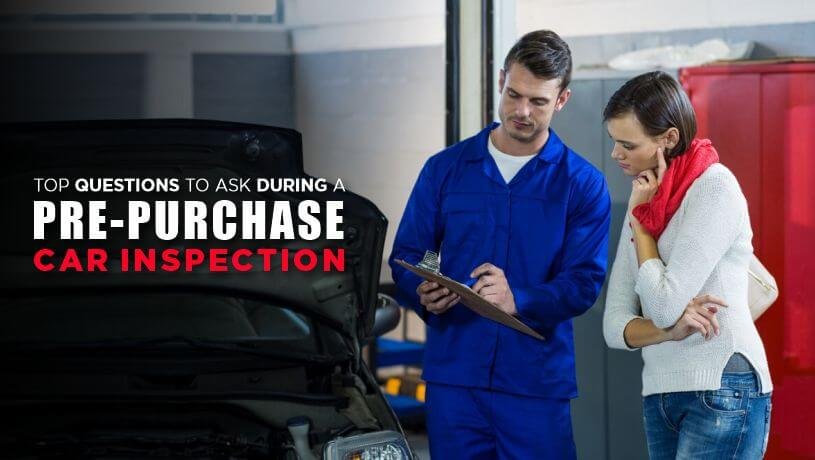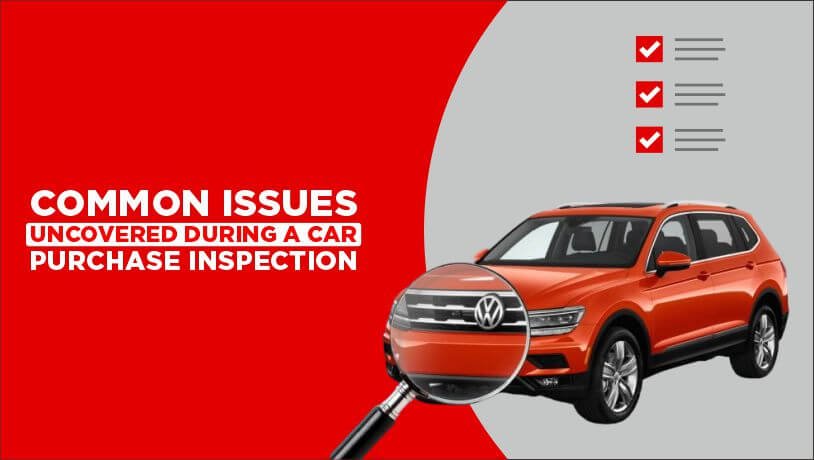Car purchasing is one of the most satisfying activities, but it may overwhelm most people. Whether you’re putting your money into a shiny new car or a four-wheeler with mileage, it is critical to make the right decision. A pre-purchase inspection is one of the effective ways through which you can safeguard yourself. It will probably give you information on how the car looks if you don’t have to spend more money in the future. This article will describe the most compelling questions that should be asked during the pre-purchase car examination. Why is Pre-Purchase Car Inspection Important? However, a Car inspection can be defined as a thorough inspection by a mechanic to establish the car’s performance before purchase. With either a new or a previously owned car, the aim is to determine whether there is potential for massive repair expenditures. Hence, the questions that should be formulated during this inspection are essential. Key Questions to Ask During a Pre-Purchase Inspection Let us go over some important questions to ask during the inspection. These questions assist in identifying crucial aspects that can impact the vehicle’s performance and reliability. 1. Has the Car Been Involved in Any Accidents? The buyer should know if the car has been in any crash before. This is why the history of accidents is reflected in the structural condition of the car. Most importantly, it is possible for previous damage to be hidden; therefore, the mechanic should be asked about it when you take your car in for some repair work.a) A repair history report may reveal problems that otherwise go unnoticed.b) Another option is to use Carfax’s services to get a more detailed history. 2. What is the Condition of the Tires? The shape of the tires is essential to both the safety of your car and the expenses you will have to face. Tires with low treads could be due for replacement soon, which is costly. Ask the mechanic to check:a) Tire tread depthb) Tire alignment and balancing 3. Are There Any Fluid Leaks? One of the vital signals to be looked at is the presence of fluid leaks. Liquids and gases in a car are critical in the vehicle’s performance. The drips on the parking lot – engine oil, brake fluid, and coolant – could reveal some problems. If there is some leakage, you should ask where it leaks from and how bad it is.a) Oil leaks can often mean engine or transmission issues.b) While small leakages may be accommodated, large leakages can prove very expensive. 4. What is the Condition of the Brake System? Without brakes, a car is just a dangerous machine doomed to wreak havoc in the nearest traffic circle. They could be worn, and this could reduce your ability to stop very quickly if there is an emergency. You should consult the mechanic regarding the brake pads, discs, and fluid.a) Old brakes will require prompt attention from a mechanic.b) Brake fluid should be transparent so that no sedimentation substance is visible. 5. Is There Any Rust or Corrosion? Rust can weaken the vehicle’s frame and chassis and is a significant factor that shortens the car’s lifespan. It is barely noticeable, particularly on the undercarriage, where it will likely decay. Rust usually signifies long-term dampness, which is generally accompanied by more issues in the future. Therefore, ask the mechanic to check:a) An inspection for checking the car for possible rust or corrosion on the frameb) Wheel wells and door panels 6. What’s the Condition of the Engine? Actually, the engine may be said to be the soul”, or the core of a car. If the four-stroke engine is well maintained, it will provide the citizens with a comfortable drive. Ask the mechanic to check for the following:a) Leaksb) Unusual noisesc) Smoke from the exhaustA well-maintained engine should rev smoothly and produce little or no noise. If you hear knocking or other strange noises, trouble brewing is brewing. 7. Are There Any Warning Lights on the Dashboard? Some of the warning lights on the dashboard include The check engine light, which signals major problems. Ask the mechanic to check for the following:a) Engine lightb) Battery lightc) ABS lightIf any lights are on, ask what they mean and whether they can be easily fixed. The Bottom Line Examining a vehicle before purchasing is highly recommended before the purchase is made. That way, you’ll be confident that you’re making the right decision when you’ve asked all the right questions. In conclusion, attention is drawn to such aspects of the car as its history, the state of tires, fluids, brakes, engine, suspension, and electronics. Finally, engaging the best mechanic in the market is essential to give the best evaluation. That way, you shield yourself from extra expenses and standard future problems falling under maintenance. Don’t leave your next car purchase to chance! Protect yourself from costly surprises with a comprehensive pre-purchase car inspection in NSW. Our expert mechanics dive into every detail, from engine health to accident history, so you can buy with confidence. Schedule your inspection today and drive away with peace of mind!
Common Issues Uncovered During A Car Purchase Inspection
Purchasing a car is an important yet not always unproblematic process. Getting the processes done can take so much time, work, and even money. However, a car purchase inspection remains one of the most essential activities that have to be performed for successful acquisition. If this step is ignored, it may cause several problems and require a lot of money to repair. A pre-purchase inspection is a professional examination of a car’s condition and a quality check before buying it. This article will highlight the issues likely to be revealed during a car vehicle check, and the reasons for such checks being essential to any buyer will also be provided. It is now high time that we looked at some common issues that may be encountered during these decisive assessments. Why is a Car Purchase Inspection Important? Now, let’s turn to the frequently encountered problems, but first, the question of why a car purchase inspection is so significant. A pre-purchase inspection is a comprehensive assessment of the car’s status before it is bought. It helps them find existing flaws that are not easy to notice by looking at the company’s financial statements. Knowing these problems in advance can help you avoid them when choosing one and save your time, money, and health. Key Benefits of a Pre-purchase Car Inspection: 1. Peace of Mind: Knowing your car won’t break down is great when you drive away. 2. Cost Savings: Prevent fixing something that has gone wrong with your vehicle in the future. 3. Negotiation Power: Use that information to ask for a lower price from the seller. Common Issues Uncovered During a Car Purchase Inspection Now that we know its importance let’s consider common problems that can be detected during a car vehicle check. Knowledge of these can make the reader make an informed decision. a) Engine Performance Problems The engine is occasionally one of the most essential parts of a car. Controversies that can be identified here can result in considerable expenses. A pre-purchase inspection typically includes checking for: 1. Engine Leaks: Oil or coolant leaks are signs of issues occurring. 2. Strange Noises: Some noises should make you suspect your engine is worn out. 3. Excessive Smoke: Some exhaust fumes are unhealthy and dangerous to experience; this smoke is one of them. Signs to Look For: Problems when starting the engine. Rough idling or stalling. Low power or acceleration issues. These may be symptoms of conditions that are serious and need prompt attention. Therefore, contacting them early is cost-effective compared to contacting them when their impacts are realized. 2. Transmission Issues One common complaint can cause several expensive breakdowns. It should also be noted that the transmission should also be checked during the car purchase inspection. Mechanics often look for: Fluid Leaks: Another sign to look out for is when the car emits transmission fluid. Slipping Gears: Shifting can sometimes be an issue in the context of their use. Rough Shifts: Shifting roughly from one gear to another means that the gears wear off. Common Symptoms: Shaking or grinding feeling in the course of changing gears. Warning lights on the dashboard. Unusual sounds when shifting. A working transmission is one of the most important aspects affecting safe car operation. This is why one has to do a quick search and determine if there are any problems before you buy. 3. Brake System Defects Brakes are essential for your safety. A pre-purchase inspection should always encompass a brake inspection. Mechanics evaluate: Brake Pads: The pads get so worn out that they would require replacement. Brake Fluid: It degrades performance at low levels. Calipers and Rotors: Inspect for wear or damage. Signs to Watch For: Persistent or squeaky sound when the brake is applied. Spongy or hard feeling in the brake pedal. Swerving to one side when applying brakes. Maintaining the brake system is an indispensable manner to protect the safety of the drivers. For one thing, these are vital for the safe operation of a motor vehicle in any part of the world. 4. Suspension and Steering Problems The suspension also determines the comfort a vehicle provides and its performance. A car vehicle check should evaluate the following: Shocks and Struts: Worn components can lead to a rough ride. Alignment Issues: Misalignment can cause uneven tire wear. Steering Components: Check for looseness or play in the steering wheel. Common Symptoms: The car pulls to one side. Swerving or being in actual motion, gyrating. Noises when going over bumps. Knowing when suspensions are wrong will make every ride more enjoyable and secure. Electrical System Faults Contemporary cars are categorized as having a massive, complicated network of electrical circuitry. Therefore, a pre-purchase inspection should check: Battery Health: A low battery is always lousy news. You can be stranded without even knowing it. Lighting: Check all lights to see that they are working well. Electrical Components: Check test windows, locks, and infotainment systems. Signs of Electrical Issues: Flashing lights within a car or use of warning symbols such as blinking bulbs. Non-watertight and ineffective casements or locks. Failure to respond in audio or navigation systems. Failure to get a satisfactory solution for an electrical problem may lead to frustration. Therefore, it is advisable to deal with them before making a purchase. Body and Structural Damage While one could easily identify exterior damages, structural ones are not so easily noticeable. A car purchase inspection includes: Frame Inspection: If you are looking for a frame, you should look for bends or rusted areas. Paint Condition: If the paint on doors, trim, or moulding has been applied unevenly, it can be a sign of repairs. Panel Alignment: Old accidents are signified by misaligned panels. Signs to Look For: Lack of smooth joining of body panels; large differences between surfaces. Rust spots or bubbling paint. Locked doors that cannot shut down fully and properly. Some of these can lead to safety concerns or issues related to resale value. Hence, it is wise to give them attention

